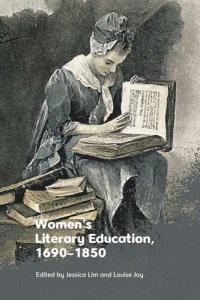
Ebook: Women's Literary Education, c. 1690–1850
Author: Louise Joy (editor), Jessica Lim (editor)
- Year: 2023
- Publisher: Edinburgh University Press
- Language: English
- pdf
Studies how women writers shaped long-eighteenth-century educational discourse through literature
- Brings together researchers from a range of disciplinary areas: literary studies, history, book history, eighteenth-and-nineteenth-century studies, gender studies, the history of philosophy, the history of education, theological studies, and childhood studies
- Focuses its study on the literary forms, techniques and genres deployed by female authors in the period
- Examines female educationalists’ interaction with: forms such as the novel, the conversational primer, children’s poetry, non-fiction textbooks; the Classics; theories of translation; psychology; theories of pedagogy; practices in relation to literacy; and politics
This volume brings together leading critical voices from a range of disciplines to examine the complex and profoundly significant ways in which female literary artists interrogated and advanced educational philosophy and practice. The volume recreates the plurality and non-linearity of the conversations and forms of literary expression that took place in and through this body of educational writing. Literature and education in the long eighteenth century share certain perceived aims: the transmission of knowledge, strengthening of understanding, acculturation, and sometimes empowerment. They also share structural forms: lessons; conversations; letters; dramatizations; confessions; narratives; imitations; sometimes fantasies. In the long eighteenth century, authors of literary texts were often authors of educational treatises who saw their activities in both spheres as interrelated. As such, the parties of teacher and pupil, author and reader frequently overlap. This book provides a historically sensitive understanding of the fraught relations between these parties, drawing attention to the period’s debates about authority and freedom as they relate to matters of gender, race, religion, age, and class. This project provides a nuanced understanding of women’s literary contributions to the period’s strands of educational thought, enabling us to better understand the many and complicated ways in which authors and readers of the period envisaged that literary texts might fulfil, fail, or refuse to fulfil, educational functions.